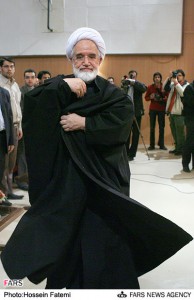Thursday
Oct152009
Iran: Karroubi Responds to Government Threats "Bring. It. On."
 Thursday, October 15, 2009 at 16:42
Thursday, October 15, 2009 at 16:42
Iran: The Latest on Mehdi Karroubi
The Latest from Iran (15 October): Restricting the Movement
The Latest from Iran (13 October): Government Threatens Karroubi
Receive our latest updates by email or RSS SUBSCRIBE TO OUR FEED
Buy Us A Cup of Coffee? Help Enduring America Expand Its Coverage and Analysis
 Enduring America, 14 October: "We’re wondering, 'Does Karroubi back down?', and we’re thinking, 'No.' His response to the Government’s ham-fisted warning, which following similar threats over the last two months — may not come today, but I would look for a clear signal from the cleric by the weekend."
Enduring America, 14 October: "We’re wondering, 'Does Karroubi back down?', and we’re thinking, 'No.' His response to the Government’s ham-fisted warning, which following similar threats over the last two months — may not come today, but I would look for a clear signal from the cleric by the weekend."
We were wrong. Karroubi did not wait until Saturday or even the Iranian weekend on Friday. He has welcomed the promise of Gholam-Hossein Mohseni-Ejeie, Iran's General Prosecutor, to “take [Mir Hossein] Mousavi and Karroubi to court when the time is right”, with the unsubtle hint that he can now bring out some very heavy evidence (English summary via Facebook page linked to Mousavi):
The Latest from Iran (15 October): Restricting the Movement
The Latest from Iran (13 October): Government Threatens Karroubi
Receive our latest updates by email or RSS SUBSCRIBE TO OUR FEED
Buy Us A Cup of Coffee? Help Enduring America Expand Its Coverage and Analysis
 Enduring America, 14 October: "We’re wondering, 'Does Karroubi back down?', and we’re thinking, 'No.' His response to the Government’s ham-fisted warning, which following similar threats over the last two months — may not come today, but I would look for a clear signal from the cleric by the weekend."
Enduring America, 14 October: "We’re wondering, 'Does Karroubi back down?', and we’re thinking, 'No.' His response to the Government’s ham-fisted warning, which following similar threats over the last two months — may not come today, but I would look for a clear signal from the cleric by the weekend."We were wrong. Karroubi did not wait until Saturday or even the Iranian weekend on Friday. He has welcomed the promise of Gholam-Hossein Mohseni-Ejeie, Iran's General Prosecutor, to “take [Mir Hossein] Mousavi and Karroubi to court when the time is right”, with the unsubtle hint that he can now bring out some very heavy evidence (English summary via Facebook page linked to Mousavi):
I very much welcome this event so that if during... these years due to some considerations I have not raised some issues, I could do so in detail.
Unfortunately in these years the authorities who, according to Imam Khomeini should be the servants of the nation, have not paid any attention to this advice. Instead of being responsible and taking fair positions, they have confirmed the positions of extremist media to hide their unjust behaviour and also insult and falsely accuse others who do not have any media [to defend themselves].
This time not only I am not concerned about the “trial” but also I very much welcome it so that by this means I can emphasise my concerns that arise from national and religious beliefs of the Iranians and Imam Khomeini’s ideas, and clearly reveal those who are oppose to these concerns.

 On Wednesday,
On Wednesday,  Haaretz has obtained a copy of
Haaretz has obtained a copy of 